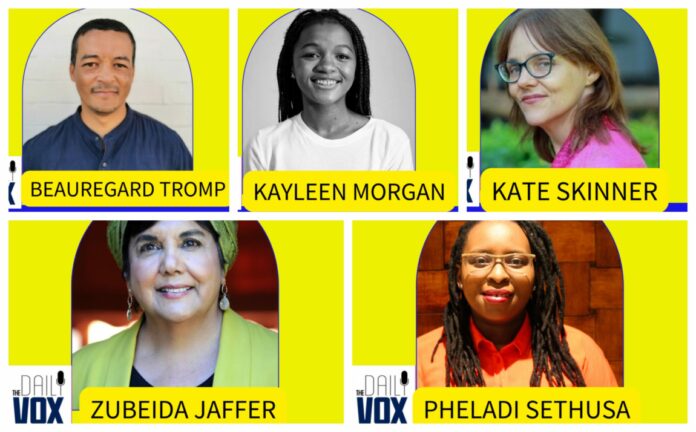On June 14, in honour of Youth Month and the 8 year anniversary of The Daily Vox, The Daily Vox team hosted a webinar discussion. The discussion focused on “The Future of Media” and journalism in South Africa. The discussion was moderated by The Daily Vox’s co-founder Khadija Patel. The panel included Kayleen Morgan, Pheladi Sethusa, Beauregard Tromp, Zubeida Jaffer and Kate Skinner.
The speakers:
- Kayleen Morgan, multimedia journalist at News24
- Beauregard Tromp, Africa editor with the Organised Crime and Corruption Reporting Project
- Pheladi Sethusa, lecturer of Journalism and Media Studies at Wits University
- Zubeida Jaffer, journalist, author and activist.
- Kate Skinner, media freedom activist since 1994.
The full discussion can be found here
South African journalists have been crucial in exposing the alarming levels of corruption the government is partaking in. However, Patel began the panel discussion by noting her growing concerns about the media solely functioning as a response to state corruption.
“While this is a very necessary and vital role, it is not the only role of the media,” Patel noted.
Local journalists have succeeded in consistently revealing state corruption and white-collar criminality. However, it is important to ask how South African journalism could improve in other areas and start functioning in different ways. For Tromp, he is seeking more emphasis on narrative journalism in this country such as the piece Morgan wrote about the floods in Kwa-Zulu Natal.
“Those kinds of stories ultimately speak to so many other subjects. I think that they are critical and also people can relate to them,” said Tromp.
On June 15, the Reuters Institute released their Digital News Report for 2022. For the section on common reasons for news avoidance, 36% of markets said the news brings their mood down. Given that people turn away from the news because it makes them feel bad and invokes a sense of helplessness, the question was asked of the antidote.
It was suggested that journalism with a more narrative and human focus could be the antidote to bad news fatigue. This could help people connect to the stories they read. The overwhelming amount of news relating to corrupt politics creates a disconnect for ordinary citizens who cannot identify with the political elite who remain the subjects of these stories.
“How can we relate to the people?” Tromp further asked.
Finding a way to relay people’s everyday concerns and reflect their realities seemed to be a topic of significant concern for many of the speakers. For Skinner, she believes that genuine diversity in media can only be achieved once adequate resources are given to journalistic platforms throughout the country, not just in the three major metropoles. Community media, such as newspapers and radio stations, have played an important role in ensuring that news can be given to those in smaller towns and rural areas in their own language. Though these publications are in abundance, mainstream media has yet to filter these voices in.
“For me, the big issue about the media is genuine and real diversity and I don’t think we’re gonna see genuine, real diversity of language, content and voice… until we start to focus a little bit more on community media,” said Skinner.
She also highlighted the importance of multimedia journalism since rural areas still value print publications despite the medium’s relative decline in urban centres. As technology continues to develop, retaining print media can be a way to ensure that people are not denied access to news due to the technological divide.
Morgan noted that improving the media landscape also means building media centres in rural areas instead of national news merely coming in to report stories then leaving. This could build more trust in media amongst communities who are usually sceptical of big media houses coming in to tell their stories.
“Who is the news for? And who gets to tell these stories?” asked Morgan, who believes these questions are vital to assess.
It seemed that widening the scope of stories told in South Africa was a key element of making a better future for local media. Jaffer explained that telling stories that can give hope to people is necessary to combat negative news fatigue. Especially since the pandemic began, people are feeling bombarded by bad news and combined with the news regarding our own state failures, South Africans are starting to become alarmingly cynical.
“We mustn’t be cynical, we must be sceptical,” said Jaffer.
But it is a challenging task to provide stories that are hopeful when so much of South African reality is dim and heavy. Sethusa said she thought that giving a glimpse of how South Africans are being proactive about their lives can balm the fatigue and pessimism felt towards news. She also noted that an important part of improving the media landscape is ensuring decolonisation is taken seriously in all of its manifestations.
“Colonialism is obviously the structure and law but there is also coloniality which is the way people think and behave under a system. So I think what we’ve done very well is changing the rules and law and beginning to shift the structure… but what we didn’t anticipate having to contend with is changing mindsets,” Phaladi noted.
Ensuring a bright future for media, then, is not just about all the structural ways that diversity can be incorporated such as through resource distribution. It is also about addressing the smaller things, such as questioning why indigenous languages are always italicised in South African publications, that will contribute to making a better media landscape for all.
Ultimately, the sentiment all speakers shared was that they want to see South African journalism being more reflective of the South African reality especially away from the city centres.
Join the conversation! We would like to get your feedback and comments on the discussion. Tweet us @thedailyvox or email us info@thedailyvox.co.za We want to take the conversation further.









